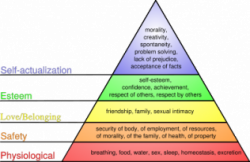|
This is the last post in the series on Maslow's pyramid and how it affects the corporate strategists and entrepreneurs. Maslow's theories are taken again and again under different words in many business books and it always comes down to this conclusion :
2 Comments
Simon Cadieux
24/2/2008 02:14:09 pm
You make my day with this blog entry. It's just so... well.... true..!
Reply
27/2/2014 03:42:40 am
Depending on the goal that you or me have set, anyone among who need free papers the students like us is looking for a professional who will agree to compose a big research in short time. Generally it means that we all are concerned about our mental health and studies at high school we study in.
Reply
Leave a Reply. |
AuthorEverything you never wanted to know about the author is on this web site : www.jeanfahmy.com Categories
All
Archives
December 2014
|

 RSS Feed
RSS Feed